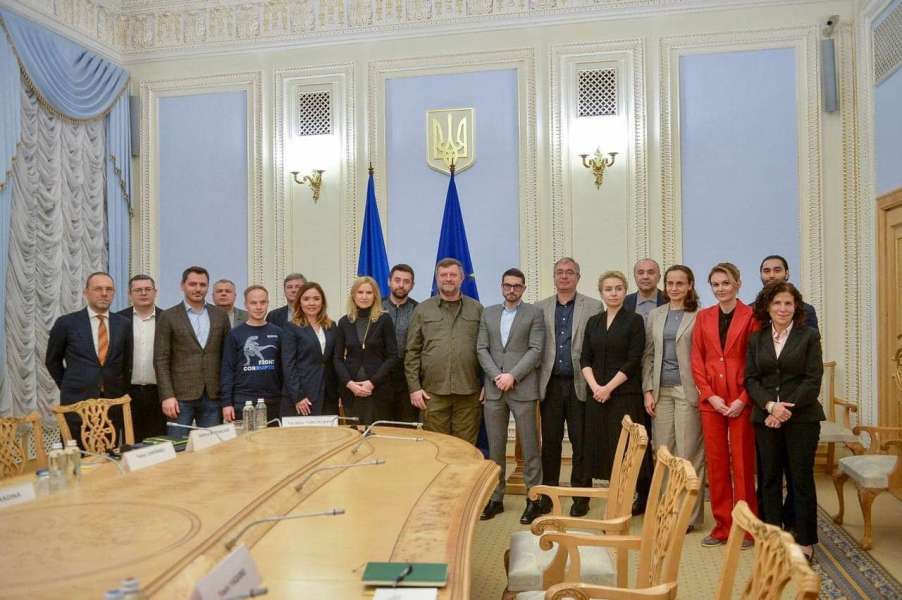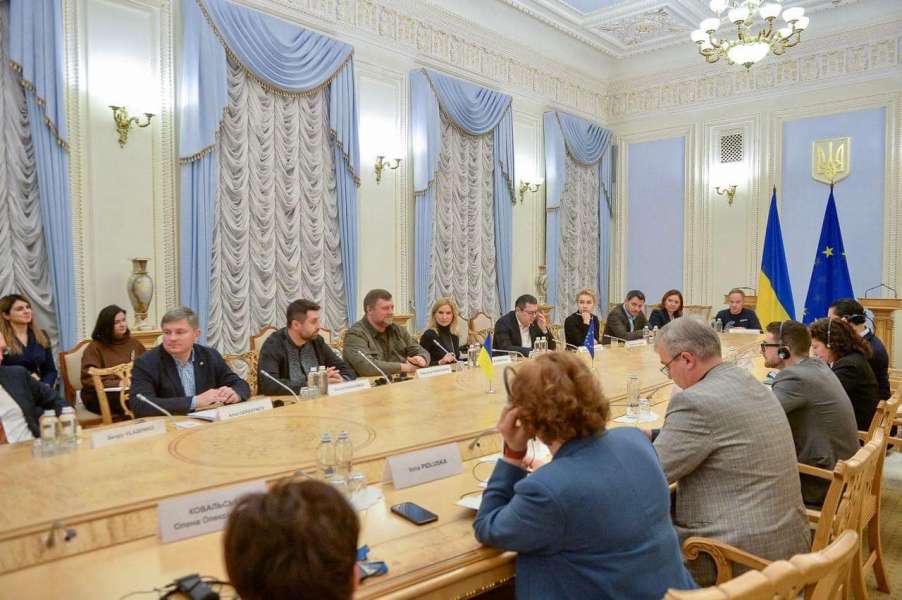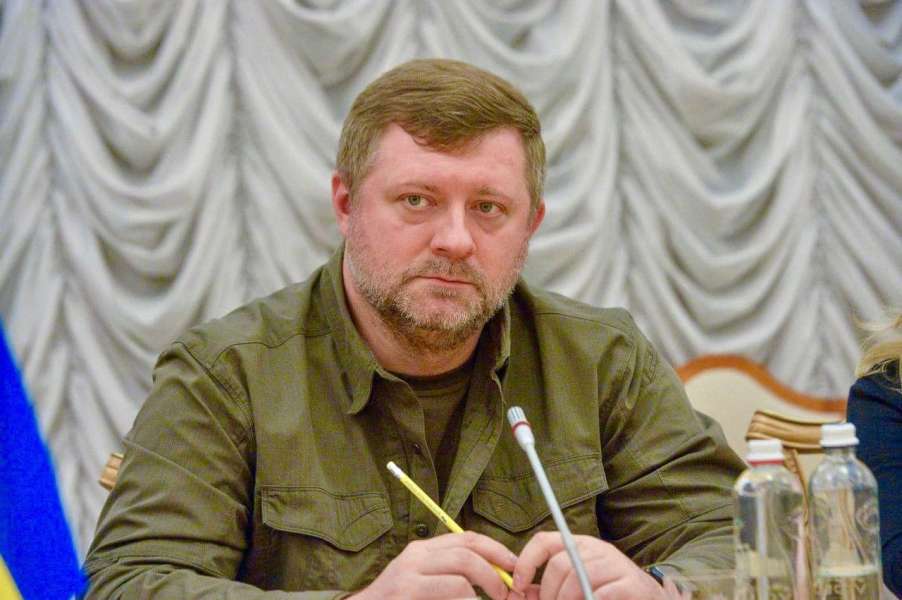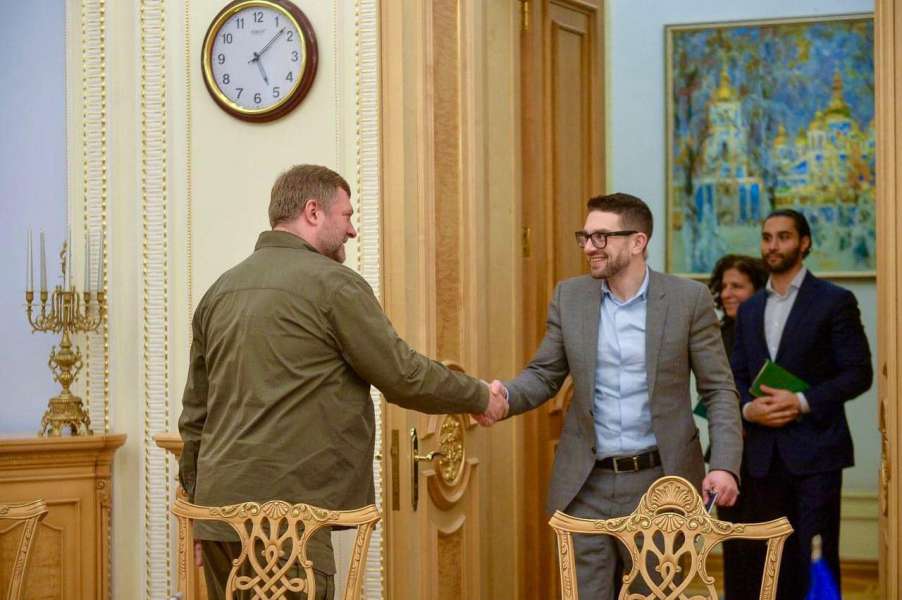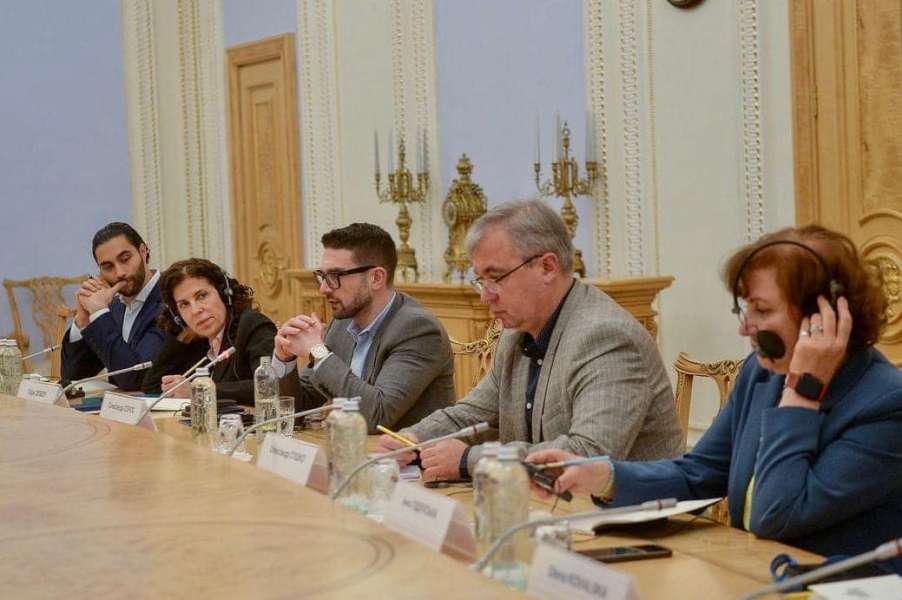The First Deputy Chairman of the Verkhovna Rada of Ukraine Oleksandr Korniienko and Deputy Chairman of the Verkhovna Rada of Ukraine Olena Kondratiuk, as well as heads of factions and committees, met with the Chairman of the Board of Directors of the Open Society Foundations, Alexander Soros, and representatives of the International Renaissance Foundation.
The participants discussed possible areas of cooperation. They discussed ways to support and build democracy in Ukraine, the adaptation of veterans in society after returning from the frontline, humanitarian aid and women’s leadership in Ukraine.
“One of the central topics of our dialogue was strengthening Ukraine’s democratic stability and increasing our country’s readiness to join the European Union,” said Oleksandr Korniienko, the First Deputy Chairman of the Verkhovna Rada of Ukraine. He noted that the conversation touched upon the ways of major reforms, as well as their improvement and ensuring compliance with European standards.
The parties also discussed aspects of international solidarity and its expansion. “This, in particular, concerns communications and spreading the truth. A separate area is the fight against russian propaganda in the countries of the Global South,” said Oleksandr Korniienko.
He also focused on increasing interaction between the state and civil society: “After all, dialogue and cooperation are an important component for the development of society.”
“The terrorist state must pay for its crimes. In particular, the seizure of russian assets and their use for the reconstruction of Ukraine. This will send a signal to everyone that no one will go unpunished,” said the First Vice-Speaker, adding that holding russia accountable for its actions will make it impossible to repeat the atrocities.
“Ukraine continues
to fight. The main tasks include strengthening the Defence Forces and air
defence. This is what brings the victory closer,” said Oleksandr Korniienko,
stressing that the development of the Ukrainian economy and veterans’ policy
are also important.
“The International Renaissance Foundation is a part of the Open Society Foundations and it did not stop working after the start of the full-scale invasion – it supported Ukrainians, in particular, defenders, and more than 800 projects,” said the First Deputy Chairman of the Verkhovna Rada of Ukraine, expressing gratitude for the support and assistance.
According to Olena Kondratiuk, the Deputy Chairperson of the Verkhovna Rada of Ukraine, given the current and post-war challenges, it is very important to support women’s leadership, both political and economic. “It is necessary to ensure women’s representative participation and equality in the processes that bring our victory closer, as well as in post-war reconstruction,” the Vice Speaker emphasised.
As an example of women’s leadership in times of war, she cited the fact that more than 60,000 women serve in the Armed Forces of Ukraine, the best figure among NATO countries. More than five thousand of them are fighting on the front line.
“It is extremely important to preserve and develop all the initiatives to support women that exist now thanks to your Foundation. I would also like to draw your attention to the need for as many women’s entrepreneurship projects as possible. Of all the businesses that are started during the war, 53% are women’s businesses. At the same time, some women are acutely aware of the consequences of the biggest humanitarian crisis since the Second World War. And they take full responsibility when their husbands are at war. That is why we should pay special attention to supporting women’s participation in decision-making and economic activity,” said the Vice Speaker Olena Kondratiuk.
For his part, the Chairman of the Board of Directors of the Open Society Foundations, Alexander Soros, stressed that support for Ukraine remains a priority for the Foundation.
“We are proud to support Ukraine, its commitment to democracy and Ukrainian civil society, which helps to unite Ukraine and the democratic world in times of war and peace,” said Soros.
The interlocutors paid special attention to volunteering, namely, the needs of volunteers, problems in their activities and ways to solve them, as well as the directions of development of the volunteer movement.
“Ukraine is a country of volunteers. It started with the Maidan and was strong during the quarantine. It is still going on. We have people who help return prisoners of war, who try to rehabilitate the military and civilians,” said David Arakhamiia, the Chairman of the Servant of the People parliamentary faction.
He was supported by Oleksandr Sushko, the Executive Director of the International Renaissance Foundation: “The International Renaissance Foundation supports hundreds of initiatives. Last year alone, more than 30 organisations received support in Ukraine. Volunteering is the essence of civil society, which creates a new quality of public participation.”
Another important topic of the meeting was the issue of taking the necessary measures to prevent the russian federation from circumventing sanctions. In particular, the interlocutors considered the option of the international community’s assistance in introducing secondary sanctions against countries that help russia circumvent primary sanctions.
Artur Herasymov, the Co-Chair of the European Solidarity parliamentary faction, stressed that the size of sanctions is directly related to the number of casualties at the front, and that russia must understand that it will not be able to circumvent the sanctions.
At the same time, Oleksandr Merezhko, the Chairman of the Committee on Foreign Policy and Interparliamentary Cooperation, added that it is important to keep Ukraine’s issue at the top of the global agenda.
“It is necessary to support the Peace Formula of the President of Ukraine Volodymyr Zelenskyi, because it is the only fair solution based on international law and the UN Charter. In July, the NATO Summit will be held in Washington. And we need to be invited to join the Alliance. This is extremely important for us,” the MP said.
The participants of the meeting also discussed the decentralisation reform in the context of democratisation and the role of local authorities in the development of a free civil society. They also emphasised the importance of anti-corruption reform at all levels, as the fight against corruption is one of the key factors in Ukraine’s European integration.
“The idea of confiscating russian property and funds in the amount of $300 billion is currently relevant to us. This money could help the Ukrainian economy,” said Anastasiia Radina, the Chair of the Committee on Anti-Corruption Policy.
She also added that anti-corruption reform in Ukraine has made significant progress over the past ten years, but that support for regional institutions, strengthening monitoring at all levels and objective information on the issue to Ukrainian society are now crucial.
Regarding the adaptation of veterans, Yehor Chernev, the Deputy Chairman of the National Security, Defence and Intelligence Committee, stressed that it is important to give them the opportunity to become the same part of society as they were before the war. This requires not only physical rehabilitation, but also psychological rehabilitation and socialisation measures.
The Ukrainian MP also noted that Ukraine needs the help of the Renaissance Foundation in demining the territories.
Halyna Mykhailiuk, the Deputy Chair of the Committee on Law Enforcement, thanked the Foundation for recording war crimes, as this will help bring russia to justice after Ukraine’s victory.
At the end of the meeting, the parties expressed their gratitude to each other for the fruitful work for the benefit of democracy and open society.
The meeting was also attended by the First Deputy Chairman of the Verkhovna Rada Committee on Transport and Infrastructure Yuliia Klymenko, First Deputy Chairman of the Verkhovna Rada Committee on Anti-Corruption Policy Yaroslav Yurchyshyn, Deputy Chairman of the Verkhovna Rada Committee on Law Enforcement Hryhorii Mamka, Member of the Verkhovna Rada Committee on Legal Policy Serhii Vlasenko, Members of the Verkhovna Rada Committee on Energy, Housing and Utilities Anna Skorokhod and Maksym Yefimov, and Member of the Verkhovna Rada Committee on Finance Borys Prykhodko.
For reference. The International Renaissance Foundation is the oldest Ukrainian charitable foundation that has been building an open society for a free state in Ukraine since 1990. Since the first days of the full-scale invasion, the International Renaissance Foundation has been supporting Ukraine. In 2022, the Foundation supported more than 800 projects totalling $18.7 million.
The Foundation is part of the Open Society Foundations, the largest private philanthropic foundation in the world that supports human rights, justice and good democratic governance.
In early March 2022, the Open Society Foundations, together with the International Renaissance Foundation, launched the Ukraine Democracy Fund (UDF), whose main goals are to preserve a stable democratic Ukraine; maximise russia’s accountability for the war; and expand international solidarity with Ukraine.
